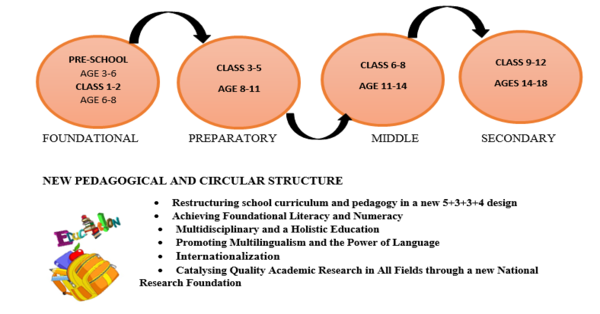
NEP 2020: In a Nutshell
Editorials News | Sep-07-2020
This National Education Policy 2020 (NEP20) is the first education policy of the 21st century and aims to address the many growing developmental imperatives of our country. This Policy proposes the revision of all aspects of the education structure, including its regulation and governance, to create a new system that is aligned with the goals of 21st-century education, including SDG4, while building upon India’s traditions and value systems.
The National Education Policy emphasizes the development of the creative potential of each individual. It is basically supported on the principle that education must develop both the ‘foundational capacities’ of literacy, numeracy, and ‘cognitive capacities’, such as critical thinking and problem-solving in addition to building ethical, social, and emotional capacities and dispositions.

This policy envisages that the extant 10+2 structure in school education will be modified with a new pedagogical and curricular restructuring of 5+3+3+4 covering ages 3-18 years. Flexibility is provided to choose subjects across streams. Till class 8th, there will be 3 language policy with a preference for local language medium of instruction. Each college would convert into an autonomous or fully integrated into a university and independent degree giving institution. Each higher education institution (HEI), whether college or university would be governed by an independent board, and SAT-like college entrance test will be conducted twice a year. Colleges are to adapt a 4-year multi-disciplinary bachelor program. Top-rated global universities will be facilitated to come in India and top Indian institutions to be encouraged to go global.
The ray of hope has come through the new National Education Policy 2020, which talks about sustainable human development and universal education learning with equity and learning outcomes with a research-oriented mindset. As the cornerstone of all educational decisions, India has always placed education at the center of its development agenda, and with bridging the gender, social, regional gaps with community participation, it will raise the spirits towards equal opportunities to all ensuring equity in this policy.
Any policy’s effectiveness depends on its implementation. Implementation will require multiple initiatives and actions, which will have to be taken by multiple bodies in sync. Therefore, the implementation of this Policy will be led by various bodies including MHRD, CABE, Union and State Governments, education-related Ministries, State Departments of Education, Boards, NTA, the regulatory bodies of school and higher education, NCERT, SCERTs, schools, and HEIs, through the coherence in planning and synergy across all these bodies involved in education.
Related News
-
Nepal's Mount Everest Cleanup Efforts
-
Nepal's Hydropower Projects
-
Improving Education in Nepal
-
Women's Empowerment in Nepal
-
Nepal's Agricultural Development
-
Advances in Russian Neuroscience: New Hope for Patients
-
Russian Scientists Discover New Gene Therapy Techniques
-
Russia's Biomedical Industry: Growing Innovations
-
History of Indigo Plantation in Colonial India
-
Diwali: Festival Of Lights Not Crackers
Most popular news
- The Law Of Equivalent Exchange
- Essay On Issues And Challenges Of Rural Development In India
- Srinivasa Ramanujan And His Inventions
- The Youth Is The Hope Of Our Future!
- Poverty In India: Facts, Causes, Effects And Solutions
- Top 20 Outdoor Games In India
- Festivals Of India: Unity In Diversity
- Role Of Women In Society
- The Impact Of Peer Pressure On Students' Academic Performance
- Books As Companion
MUN Events
SDG Events



